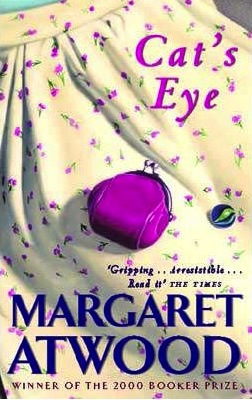CAT’S EYE
by Margaret Atwood (1988)
Owing to circumstances, I had no chance to read Cat’s Eye the way I would have liked to, which is more or less in one gulp. Despite the slightly broken reading experience, the book kept me hooked.
The story unravels mostly in present tense and through different viewpoints separated by time and age, shifting between a middle aged woman’s thoughts and the mind of a young girl gradually growing up to become that middle aged woman re-living her past. The changes in the inner world of the main character, Elaine, are subtly reflected in the writing, moving from the hilariously detailed, childlike observations of the happy times, to darker, more serious, ironic wording and imagery of adolescent detachment, and a young woman’s nervous, confused self-awareness and efforts to find out what to be and with whom.
It is as if Elaine is trying to trace an explanation to something about herself, trying to solve some mystery about her own identity by testing one possible theory, and by doing this, ends up building a narrative of her life history. The theory tested is Cordelia, a childhood friendship, the sort of relationship many of us (girls?) have and then forget, but which she has not been able to leave behind.
The outcome is a great novel, where the most ordinary things feel extraordinary and exciting through the author’s brilliant way with words. Book after book it has become more and more evident to me, that as well as a great story teller, Atwood is a great master of her own language. It is obvious, that the peculiarities of any language, intricacies of its structure, the histories of names or words and their subtle ironies, meanings and double meanings are difficult if not sometimes impossible to translate. After reading Cat’s Eye, the third Atwood’s novel that I have read in English, I am beginning to suspect that my first ”encounter” with her, a Finnish translation of Housemaid’s Tale, doesn’t do justice to the original – I guess I must read that one in English, too.
(TK 2009)
ORYX & CRAKE
by Margaret Atwood (2003)
In Oryx & Crake I find Atwood doing what art makes possible, that is, putting herself in a man skin and looking at the world from therein. And biased as I may be as a woman, in my opinion she does it convincingly. As usual, Atwood does not start by revealing the scene of events all at once, in detail, but, in her manner of a skilled temptress, she shows only just enough to stir attraction, to increase anticipation. And then, through the eyes and mind of Jimmy, the Snowman, her main character, she reveals it bit by bit, unearths it from his dreams, his memories, stories he has been told, so that it is gradually exposed like a murder case in a detective story.
Snowman’s thoughts and memorizing function as a structure for telling the story, holding it all together. The stories may seem fantastic, but only as far as one can be ignorant of what is going on in this planet even today: heartless and greedy exploitation of the weak by the strong, a cruel fight for survival and pleasure. In such a reality young people like Jimmy and his friend Crake are hooked on the net, playing games, watching child porn and live executions, which have become common popular entertainment. At the same time popular sciences like biochemistry and cell biology are taking the long dreamed of leaps into making science creative in the fullest godlike sense of the word.
Against the backdrop of this not so unlikely world of our near future steered by fear, greed and lust on one hand and limitless faith and investment in science on the other, the more fantastic futuristic vision Atwood paints us stroke by stroke seems an understandable and logical counter reaction. She brings us to the threshold of a brave new world, emptied of old species, inhabited instead by gene manipulated hybrid plants, animals, and improved, physically faultless, sexually functional, perfect ”humans” undisturbed by confusing emotions. And suddenly, instead of finishing the story completely, she leaves us there to ask ourselves how we would like it to end.
(TK 6/09)


